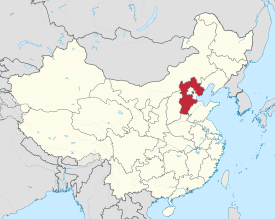Hebei province
|
Hebei Province 河北省 |
|
|---|---|
| Province | |
| Name transcription(s) | |
| • Chinese | 河北省 (Héběi Shěng) |
| • Abbreviation | 冀 (pinyin: Jì) |
 Map showing the location of Hebei Province |
|
| Coordinates: 39°18′N 116°42′E / 39.3°N 116.7°ECoordinates: 39°18′N 116°42′E / 39.3°N 116.7°E | |
| Named for |
河 hé—"(Yellow) River" 北 běi—"north" "north of the Yellow River" |
| Capital |
Baoding (1928-58, 1966) Tianjin (1958-65) Shijiazhuang (1967-present) |
| Largest city | Baoding |
| Divisions | 12 prefectures, 172 counties, 2207 townships |
| Government | |
| • Secretary | Zhao Kezhi |
| • Governor | Zhang Qingwei |
| Area | |
| • Total | 187,700 km2 (72,500 sq mi) |
| Area rank | 12th |
| Population (2015) | |
| • Total | 73,326,101 |
| • Rank | 6th |
| • Density | 390/km2 (1,000/sq mi) |
| • Density rank | 11th |
| Demographics | |
| • Ethnic composition |
Han: 96% Manchu: 3% Hui: 0.8% Mongol: 0.3% |
| • Languages and dialects | Jilu Mandarin, Beijing Mandarin, Jin |
| ISO 3166 code | CN-13 |
| GDP (2014) |
CNY 2.942 trillion US$ 478.92 billion (6th) |
| • per capita |
CNY 40,124 US$ 6,531 (14th) |
| HDI (2010) | 0.691 (medium) (16th) |
| Website |
www.hebei.gov.cn (Simplified Chinese) english.hebei.gov.cn (English) |
| Hebei | |||||||||||||||||||||||||||||||||

"Hebei" in Chinese characters
|
|||||||||||||||||||||||||||||||||
| Chinese | 河北 | ||||||||||||||||||||||||||||||||
|---|---|---|---|---|---|---|---|---|---|---|---|---|---|---|---|---|---|---|---|---|---|---|---|---|---|---|---|---|---|---|---|---|---|
| Postal | Hopeh | ||||||||||||||||||||||||||||||||
| Literal meaning | "North of the [Yellow] River" | ||||||||||||||||||||||||||||||||
|
|||||||||||||||||||||||||||||||||
| Abbreviation | |||||||||||||||||||||||||||||||||
| Chinese | 冀 | ||||||||||||||||||||||||||||||||
| Literal meaning | [an ancient province in modern southern Hebei] | ||||||||||||||||||||||||||||||||
|
|||||||||||||||||||||||||||||||||
| Transcriptions | |
|---|---|
| Standard Mandarin | |
| Hanyu Pinyin | Héběi |
| Bopomofo | ㄏㄜˊ ㄅㄟˇ |
| Gwoyeu Romatzyh | Herbeei |
| Wade–Giles | Ho2-pei3 |
| IPA | [xɤ̌.pèi̯] |
| Wu | |
| Romanization | Ghu平poh入 |
| Hakka | |
| Romanization | Hò-pet |
| Yue: Cantonese | |
| Yale Romanization | Hòh-bāk |
| Jyutping | Ho4-bak1 |
| Southern Min | |
| Hokkien POJ | Hô-pak |
| Transcriptions | |
|---|---|
| Standard Mandarin | |
| Hanyu Pinyin | Jì |
| Bopomofo | ㄐㄧˋ |
| Gwoyeu Romatzyh | Jih |
| Wade–Giles | Chi4 |
| IPA | [tɕî] |
| Yue: Cantonese | |
| Jyutping | Kei3 |
| Southern Min | |
| Tâi-lô | Kī |
Baoding (1928-58, 1966) Tianjin (1958-65)
Hebei (Chinese: 河北; pinyin: ![]() Héběi; postal: Hopeh) is a province of China in the North China region. Its one-character abbreviation is "冀" (Jì), named after Ji Province, a Han Dynasty province (zhou) that included what is now southern Hebei. The name Hebei literally means "north of the river", referring to its location entirely to the north of the Huang He 黄河 (Yellow River).
Héběi; postal: Hopeh) is a province of China in the North China region. Its one-character abbreviation is "冀" (Jì), named after Ji Province, a Han Dynasty province (zhou) that included what is now southern Hebei. The name Hebei literally means "north of the river", referring to its location entirely to the north of the Huang He 黄河 (Yellow River).
Hebei was formed in 1928 after the central government dissolved the province of Chihli (直隸), which means "Directly Ruled (by the Imperial Court)".
Beijing and Tianjin Municipalities, which border each other, were carved out of Hebei. The province borders Liaoning to the northeast, Inner Mongolia to the north, Shanxi to the west, Henan to the south, and Shandong to the southeast. Bohai Bay of the Yellow Sea is to the east. A small part of Hebei, Sanhe Exclave, consisting of Sanhe, Dachang Hui Autonomous County, and Xianghe County, an exclave disjointed from the rest of the province, is wedged between the municipalities of Beijing and Tianjin.
...
Wikipedia
